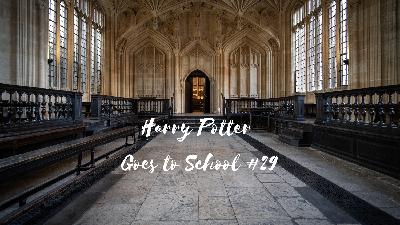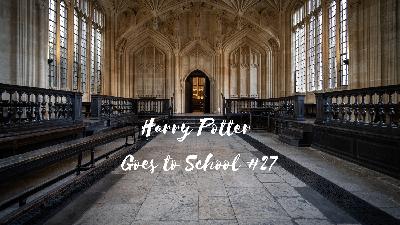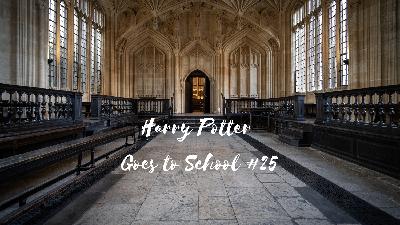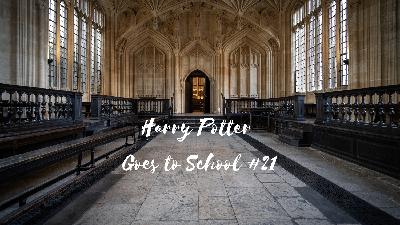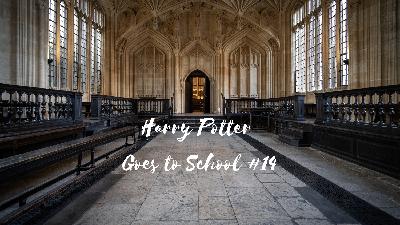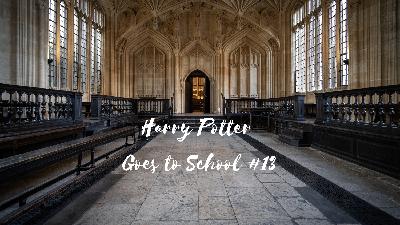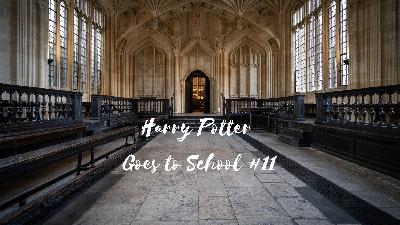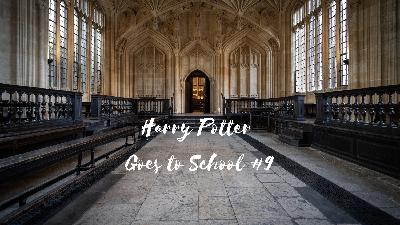Discover Harry Potter Goes to School: Learning In and Out of Hogwarts
Harry Potter Goes to School: Learning In and Out of Hogwarts

Harry Potter Goes to School: Learning In and Out of Hogwarts
Author: Carrie Birmingham
Subscribed: 5Played: 51Subscribe
Share
Description
Welcome to Harry Potter Goes to School: Learning In and Out of Hogwarts, a podcast for students, teachers, professors, parents, and anyone else interested in what a Hogwarts education has to offer. Please join us in the Great Hall for a chapter-by-chapter analysis of the Harry Potter series and all things education.
This is a scripted podcast with a narrator and voice actors. It’s designed to be entertaining first, educational second. If you’re a Harry Potter nerd and a teaching nerd, this is just for you.
28 Episodes
Reverse
I’ve looked back over all 28 episodes and found eight topics or themes that
seemed important in Harry Potter and the Sorcerer’s Stone—things that the
text has to say to the field of education, and things that education has to
say back to Hogwarts. This episode takes a look at the first four topics.
Here are all eight:
1. Hogwarts is a parody of school
2. All the people at Hogwarts are full humans
3. Learning theory
4. Joanne's literary tricks
5. Moral concerns
6. Things about teaching methods
7. Hogwarts as a miniature society
8. Themes I think Joanne intended
For every time you use your power to bring joy, inspiration, humor,
healing, and humanizing to your students, thank you. Thank you from me and
from all the people who will be living in the world with the children your
students are now and the grownups that your students will become.
After at least six months of believing that Severus Snape is trying to
steal the Sorcerer’s Stone for himself and then adjusting that to believe
that he’s trying to steal it for the Dark Lord, the puzzle pieces of
Harry’s belief system are dramatically rearranged. We are a lot like Harry.
In real life, when we’re confronted by evidence that we have been really
wrong about something, it’s really hard.
It looks like the only school subject that is useful in the
through-the-trap-door adventure is Herbology. If the purpose of the
Hogwarts series was to promote the value of academics as taught in schools,
we may expect to see a little more of what the kids learn in their classes
coming into play in this adventure.
Did you notice that for helping Hagrid in the middle of the night, Harry
and Hermione’s punishment is helping Hagrid in the middle of the night? Did
you notice that Hagrid didn’t even acknowledge that Harry and Hermione are
there in detention for helping him when he got himself into a big mess? He
just carries on, as if Harry and Hermione are just random students to him.
What’s with that?
Why did Minerva deduct only 20 house points for Draco’s nighttime
wanderings but 50 house points each for the three Gryffindors’ nighttime
wanderings? Maybe because Gryffindor is her house, and she is the kind of
person to be harder on students of her own house than students of another
house. Maybe she took off so many points because Harry is extra-valuable?
Of all the kids in the whole school, let’s not lose Harry Potter, so let’s
punish him extra to keep him safe!
Harry, Ron, and Hermione face down two crises in this chapter: Hagrid’s
illegal dragon and impending final exams. The chapter begins about ten
weeks before the end of the school year, and Hermione begins a concentrated
period of preparing for final exams. It’s good to remember that Hogwarts is
a parody of school, and the British exam system is a hard-to-miss target
for parody. Well, so is the American exam system.
Teachers love it when students have an AHA! moment. There are plenty of
AHAs in the Hogwarts series—for the characters and for the readers. The big
AHAs come at the end of each book, and the biggest AHAs come at the end of
the series. So far, our trio has AHAd that Fluffy is guarding something,
probably the grubby little package from Gringotts. The name Nicolas Flamel
is a loose end thrown out by Hagrid, and the kids have rightly figured from
Hagrid’s nervous responses that Nicolas Flamel is an important clue to
their current mystery: What is Fluffy guarding?
How routinely did Albus Dumbledore wander the halls, the classrooms, the
common rooms of Hogwarts--invisibly? Could Mrs. Norris see him? How is that
different from the way we supervise students in school with cameras,
data-gathering instructional apps, even just watching them in the
classroom? For better or for worse--students are watched and supervised and
even surveilled all the time they're in school, maybe not by anyone
invisible--but we all accept that as normal.
Christmas dinner at Hogwarts is an abundance that draws a sharp contrast to
the meagerness of Harry's life with the Dursleys. Glimpses of the
professors in a relaxed, even tipsy state amuse and amaze. Hagrid and
Professors Dumbledore, Flitwick, and McGonagall are all there, joking,
laughing, drinking, and flirting. Snape, appropriately, seems to be absent.
Harry's afternoon is filled with Christmas contentment: snowball fights,
wizard chess, leftovers, and Weasley antics. So far, the best Christmas
Harry can remember. And Christmas is about to get even better.
If this podcast series were called “Harry Potter Plays Sports” instead of
“Harry Potter Goes to School,” I’d have a lot more to say about Quidditch.
But I do have something to say about Harry’s first impression of Marcus
Flint, captain of Slytherin’s Quidditch team.
For the most part, these are really small pieces of leftovers, smaller than
what I call Bits & Bobs, so I'm calling this episode Chips & Snips. Bits &
Bobs really is a British English idiom, but as far as I know, I have
invented the idiom Chips & Snips. You're welcome. I also considered calling
this episode The Speed Round. You'll see why.
So many bits and bobs are left over in these chapters, things I didn’t talk
about in previous episodes because there were other things to talk about.
So I’ll talk about them now, and see if I can exhaust the possibilities for
education-relevant ideas here before I exhaust myself and you too, kind
listener. Harry's broom, Neville's trauma, Snape's assessment plan, and
Peeves's linguistic brain teaser are all here.
I used to think that Hermione’s big change happened in the moment between
her rescue from the troll and her lie to Professor McGonagall about why
she, Harry, Ron, and a troll were in the girls’ bathroom together. But now
I think that Hermione’s big change happened gradually over the two months
she was at Hogwarts. Clever as she is, she must have noticed that her
social approach wasn’t working very well.
Maybe I didn’t go to the right kind of school, or maybe I didn’t run with
the wrong kind of kids, but I never, never thought I was about to be
expelled from school. I can’t even remember thinking that anyone I knew was
at risk of being expelled from school. Whether it be expulsion, detention,
losing house points, or just getting caught breaking rules and whatever
comes from that, Gryffindor first years seem to think about avoiding
punishment a lot.
Harry’s hidden talent is flying, and he, Draco, Minerva, and Oliver are
about to discover it. Neville, Ron, and Pavarti Patil have a little bit of
the spotlight in this chapter too, but their hidden talents or non-talents
stay kind of hidden.
Welcome to Harry Potter Goes to School: Learning In and Out of Hogwarts, a
podcast for students, teachers, professors, parents, and anyone else
interested in what a Hogwarts education has to offer. Please join us in the
Great Hall for a chapter-by-chapter analysis of the Harry Potter series and
all things education. What would the first day of school be like without
announcements? Now then, let’s get right to it.
Since Harry is just entering Hogwarts, everything is new to him, and it’s
new to us too. And since Hogwarts is a school, there is a lot of
school-relevant material in these chapters. This episode is dedicated to
the odds and ends, bits and bobs of more and less school-relevant ideas,
the items that don’t fit into big themes but are interesting nevertheless.
Many teachers I know are especially keen to create an atmosphere that is
welcoming, warm, and safe, especially on the first days of school. This is
not the case at Hogwarts.
We have double fear in this chapter. First, in a
magical-mystery-adventure-type book series, we anticipate a good amount of
tension and fear—because we have experience reading or knowing about
magical-mystery-adventure-type stories. Second, as Harry prepares for his
first day of school at Hogwarts, we anticipate a good amount of tension and
fear—because we have been to school.


